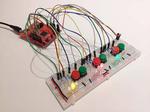Other

“Finite State Machines (FSM) are widely used in embedded applications and are well suited to controlling things that are event driven. The potential benefits include: A formal method to capture and test all states and inputs, easily defined logic, and …

